Why are so many people calling Microsoft’s Bing Wallpaper app malware?

Microsoft’s new Bing Wallpaper application has drawn significant criticism for including features that resemble malware behavior, leading to widespread concern among users. Released for Windows 10 and 11, the app automatically changes wallpapers daily but conceals multiple intrusive functionalities.
Software engineer Rafael Rivera reported these findings, prompting conversations about user privacy and application integrity.
The Bing Wallpaper app, available on the Microsoft Store, is designed to enhance user experience with a rotating selection of images. However, it has come under scrutiny for its darker functionalities. Rivera’s analysis revealed that the application installs Bing Visual Search without user consent and prompts users to make Bing their default search engine across various browsers, including Firefox and Chrome.
Moreover, the app incorporates code to “peruse and decrypt” cookies from browsers like Edge, Chrome, and Firefox, raising privacy concerns. It also accesses the geolocation web API, which likely collects location data without clear user notification.
On top of these invasive features, the application suggests making Microsoft Edge the default browser while actively launching tabs in other browsers that recommend activating a Microsoft Bing Search extension.
 Users report intrusive behavior, such as recommendations to switch to Microsoft Edge and other apps published by Microsoft
Users report intrusive behavior, such as recommendations to switch to Microsoft Edge and other apps published by Microsoft
Rivera categorized Bing Wallpaper as employing several “nasty tricks” reminiscent of unwanted software. This discovery has led tech experts to label it a potentially unwanted program (PUP). Rivera’s findings have been substantiated by various reports, as several users express distrust towards the app’s intentions and functionality.
The backdrop to these accusations is not the first time Microsoft has come under fire for perceived privacy invasions. Similar concerns surfaced with the introduction of the Recall feature in Windows 11, which captured screenshots of user activities for creating a searchable timeline. Although this feature has been confirmed as optional and uninstallable, the current situation surrounding the Bing Wallpaper app signals ongoing issues with privacy protections in Microsoft’s offerings.
The community hated the Bing Wallpaper appThe online response has been largely negative, with many users advising against installing Bing Wallpaper. Rivera’s insights have prompted an array of discussions about the implications for user privacy and the increasingly invasive nature of formerly innocuous applications.
Commentators have noted that such behavior is typically associated with malware, enhancing the feeling of distrust towards the application. Social media platforms echo the sentiment, as users vocalize their discomfort with the app’s hidden agendas.
As users navigate these concerns, it remains unclear how Microsoft will respond to the backlash. Investigations into the cloud behavior of Bing Wallpaper and the broader context of consumer protection are ongoing, highlighting potential risks associated with trusting software applications.
The tech community continues to advocate for transparency and user autonomy, emphasizing that users should maintain control over their software environments.
Image credits: Microsoft
